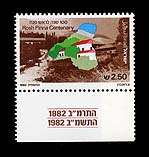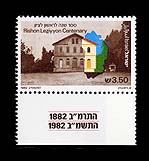|
Rosh Pinna, mother of the Upper Galilee settlements, was established in a daring act of pioneering at the dawn of Jewish colonization in the land of the patriarchs.
It all began in the period of Turkish rule when, in the year 1878, a number of families from Zefat (Safed) settled themselves on the site of the Arab village of Jauni and hebraized the name to Gi'oni. Though beset by countless difficulties and ordeals, they were not dispirited, but toiled hard and refused to abandon their land.
In 1882 a group of Rumanian immigrants joined them. They saw the barren boulder-strewn fields and vowed to restore them to life. They recalled the words of the Psalmist "The stone which the builders rejected, is become the head-stone of the corner" and called their settlement "Rosh Pinna". Their deep-felt love of the land and their determination to fulfil all those religious precepts concerned with the soil and to extend Jewish settlement, gave the pioneers the strength to overcome all obstacles - from natural disasters to hostile neighbours - and bit by bit a rocky waste turned into rich fields and vineyards.
The colony spread out up the mountainside from where it overlooks the glorious Galilee countryside, facing the majestic Mt. Hermon. Baron Benjamin de Rothschild was thrilled to see Jewish farmers working the land and making a living by the sweat of their brow and came to their assistance.
As the years went by, the isolated settlement of Rosh Pinna became the centre of a ring of new communities and to the great satisfaction of the pioneers, their dream became a reality and their village grew into an important local centre. Rosh Pinna also became a major cross-roads serving different regions of the country as well as neighbouring Syria and Lebanon.
In the 1948 War of Independence, Rosh Pinna was in the front line, but thanks to the bravery of its young people and the support of the Israeli army, the invading forces were routed and driven back across their borders.
Following the establishment of the State, new settlements - kibbutzim, co-operative smallholder settlements and even a new township - were founded, and the whole of the surrounding area became a densely populated, flourishing Jewish region.
Rishon Leziyyon, one of Israel's bustling, noisy cities, grew from a pioneering agricultural colony founded in 1882 by a group of "Hovevei Zion" from Russia who had arrived in the country while it was still under Turkish rule. They took the name Rishon Leziyyon from the book of Isaiah, 41.27 'A harbinger unto Zion will / give. 'Behold, behold them, and to Jerusalem a messenger of good tidings." The first settlers came to a neglected, desolate area of sand dunes reached only by a camel track. They were later joined by more members of "Hovevei Zion" who came to build up the country and strengthen Jewish settlement.
The founders knew nothing of farming or country life, but their determination to live in the land of their forefathers enabled them to overcome all difficulties, and they succeeded in turning a desolate waste into a flourishing settlement. Within a short time the barren sands gave way to green fields and vineyards.
The settlers received help from Baron Benjamin de Rothschild whose first project in Eretz Israel was to dig a well for the village. He followed this with the construction of the wine cellars where the grapes were pressed to produce "Carmel" wine from which the settlers gained a modest livelihood. Bottles of "Carmel" wine are found on the tables of Jews all over the world, not only gladdening their hearts but also symbolising their yearning for Zion.
As time went by, Rishon grew - economic enterprises were established and public institutions opened their doors there. It was Rishon that boasted the first Community Hall in the country as well as the first Jewish kindergarten and the first brass band. Tradition even has it that "Hatikva", the Jewish national anthem, was composed and sung there for the first time.
All around Rishon, new settlements and new factories have arisen and some of Israel's busiest highways serve the area. Yesterday's dream of the pioneers has become today's reality, as the tiny colony Rishon Leziyyon has been converted into one of Israel's important towns.


